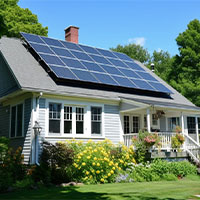Connecticut solar incentives, tax credits & rebates
Resources for going solar in 2023

Connecticut has many great incentives for those looking to go solar, including solar tax breaks and solar loan programs for homeowners. After tax credits, the average solar energy system costs $14,700 in Connecticut, cheaper than in many other states. The national average for solar energy systems is $16,715.
Key insights
- You can take advantage of solar tax breaks and loan programs in Connecticut.
- The average federal tax credit value is $6,300 in Connecticut.
- Connecticut residents with solar panels save an estimated $42,705 over 25 years.
Solar incentives in Connecticut
The federal solar investment tax credit (ITC) is the best way to save money when going solar in Connecticut. If you install a residential solar panel system by the end of 2032, you can deduct 30% of the system's total cost from your federal taxes. This includes equipment, labor and permit costs.
The ITC drops to 26% in 2033 and 22% in 2034.
For example, for a $14,700 system, you can get a $4,410 credit when you file your taxes.
To get your tax credit, you must claim it on your federal taxes for the same year that your solar panel system was installed on Form 5695.
More solar incentives in Connecticut
| Incentive type | Incentive amount | Applicable sectors | Administrator | Available statewide | |
|---|---|---|---|---|---|
| Energy conservation loan | Loan program | Up to $40,000 | Residential, multifamily residential | Connecticut Housing Investment Fund | |
| Property tax exemption for renewable energy systems | Property tax incentive | 100% exemption | Commercial, industrial, residential, schools, agricultural, multifamily residential | Connecticut Department of Revenue Services | |
| Smart-E loans | Loan program | Varies | Residential, low-income residential | CT Green Bank in partnership with Energize Connecticut | |
| Low-interest loans for customer-side distributed resources | Loan program | Varies | Commercial, industrial, local government, nonprofit, schools, state government, federal government, agricultural, institutional | CT Electric distribution company and Bank of America | |
| Sales and use tax exemption for solar and geothermal systems | Sales tax incentive | 100% exemption | Commercial, residential, installers/contractors | Connecticut Department of Revenue Services | |
| Sales and use taxes for items used in renewable energy industries | Industry recruitment/support | 100% exemption | Commercial, industrial | Connecticut Department of Revenue | |
| Commercial PACE financing | PACE financing | Varies | Commercial, industrial, multifamily residential | Connecticut Green Bank | |
| Property tax exemption for renewable energy systems | Property tax incentive | Varies | Commercial, industrial, residential, schools, agricultural | Connecticut Department of Revenue Services | |
| The United Illuminating Co. - ZREC and LREC long-term contracts | Solar renewable energy credit program | Varies | Commercial, construction, industrial, nonprofit, federal government, installers/contractors, agricultural, multifamily residential, integrators | United Illuminating Co. | |
| Multifamily Navigator Pre-Development Energy Loan Program | Loan program | Varies | Multifamily residential | CT Green Bank | |
| Low-Income Multifamily Energy Loan Program | Loan program | Varies | Multifamily residential | CT Green Bank |
Statewide residential solar incentives in Connecticut
Connecticut doesn’t have many solar incentives for homeowners. There are a few, including tax breaks and low-interest, fixed-rate loan programs.
Tax breaks
Connecticut residents can get a 100% exemption on the value a solar energy system adds for the purpose of property tax assessments. There’s also a 100% sales tax exemption on solar systems and appliances, such as solar water heaters. This can save homeowners a large chunk of money.
» MUST-KNOW: The tax benefits of owning a home: must-know deductions and secrets
Loan programs
Connecticut has several solar loans to help you finance your new system. The Smart E-loan program, for example, offers loans that vary between five and 12 years with a fixed interest rate between 4.49% and 6.99% at the time of publishing. This loan is available to all residents, including low-income homes.
Another option is the Energy Conservation Loan financing program. It allows you to get a fixed-rate loan with a cap of up to $25,000 for up to 12 years. You can qualify for zero interest if your family is below 50% of the median income. Others qualify for loans with an interest rate of up to 7%.
What to know about net metering in Connecticut
Net metering is a system that lets you use excess energy produced by your solar system that isn’t stored in a battery. The extra is passed on to the electric grid. Then your local electricity company pays for the energy in bill credits.
In Connecticut, net metering was replaced by the Residential Renewable Energy Solutions Program in 2022. To qualify, your solar system must be up to 20 kilowatts (kW) in size. You can get a flat rate for your power with the option of a cash-out each year or monthly credits on your electric bill, much like with net metering.
» GREENEST STATES: Connecticut ranks No. 19
Solar resources in Connecticut
Below are some additional resources that can guide you through transitioning to solar in Connecticut.
- Residential Renewable Energy Solutions Program
- Connecticut Department of Consumer Protection solar panel buyer's guide
- Connecticut residential solar options
- Connecticut in-home energy performance assessment
- Connecticut solar facts
- Connecticut Solar & Storage Association
» GUIDE: Solar panel installation
Find solar companies in Connecticut
Compare popular solar companies available in Connecticut below. Read our guide to finding the best solar companies for more.
| SunPower | Sunrun | ||||||
|---|---|---|---|---|---|---|---|
| Primary | SunPower | Read reviews | Customer Ratings 4.3 | Free cquote | Payment options
Cash, loan, lease
| Warranty
10 to 25 years
| |
| Primary |  | Sunrun | Read reviews | Customer Ratings 4.1 | Free cquote | Payment options
Cash, loan, lease
| Warranty
25 years
|
FAQ
Can I get solar panels for free in Connecticut?
No, there are no programs for free solar panels in Connecticut. You can lease or enter a PPA for little to no upfront costs.
» FREE SOLAR PANELS: Are they really free?
How much can I save with solar panels in Connecticut?
In Connecticut, the average savings is $42,705 over 25 years. So, you can still save a lot of money on traditional utility bills even if you don’t generate 100% of your energy needs.
Are there any commercial solar incentives in Connecticut?
Yes, businesses can take advantage of property and sales tax exemptions, solar loans and a renewable energy credits program.
» MORE: Commercial solar panels
Are there any disadvantages to going solar in Connecticut?
There are a few disadvantages to going solar in Connecticut. Though the state offers tax exemptions and loan options, it has no solar rebate programs. Also, Connecticut isn’t the sunniest state. It gets 2.5 to 3.5 average peak sun hours. That may not be enough to meet your energy needs.
» MORE: Solar energy pros and cons
Is my HOA allowed to restrict solar panels?
Your homeowners association cannot legally prevent you from using solar panels on your home in Connecticut.
How can I pay for solar panels?
While paying cash is an option, many will need to finance solar panels with a solar loan. Luckily, Connecticut offers several low-interest options. You can also consider a lease or power purchase agreement (PPA) if you’re okay with not owning your solar system.
» SOLAR PANELS: Lease vs. buy
Bottom line: How much are solar panels in Connecticut?
Going solar in Connecticut is more affordable than in other states, at a cost of just under $15,000 after tax credits. The state’s property tax and sales tax exemption can help you save a lot of money, too.
Overall, after 25 years you could save an average of $42,705, much more than residents in surrounding states. Keep in mind that you can apply for low-interest, fixed-rate loans to get your system paid off in as little as eight years or less if you can’t pay the full price upfront.
The ConsumerAffairs Research Team conducted an in-depth analysis to determine how much it costs to go solar in Connecticut and the average solar costs in other states.
Solar costs: Connecticut vs. nearby states
| Average cost per watt | Typical system size | Upfront cost* | ITC value (30%) | Payback period** | Estimated net savings | |
|---|---|---|---|---|---|---|
| Connecticut | $2.80 | 7.5 kW | $21,000 | $6,300 | 8 years | $42,705 |
| Massachusetts | $2.94 | 6.5 kW | $19,110 | $5,733 | 8 years | $33,013 |
| Rhode Island | $2.84 | 6 kW | $17,040 | $5,112 | 8 years | $34,519 |
| New York | $2.94 | 6.5 kW | $19,183 | $5,760 | 10 years | $24,387 |
| New Hampshire | $2.91 | 6.5 kW | $18,916 | $5,675 | 9 years | $28,409 |
Article sources
- EcoWatch, “ How Much Do Solar Panels Cost in Connecticut? .” Accessed Sept. 11, 2023.
- Environmental Protection Agency, “ Summary of Inflation Reduction Act provisions related to renewable energy .” Accessed Sept. 11, 2023.
- Solar Energy Industries Association, “ Connecticut Solar .” Accessed Sept. 11, 2023.
- DSIRE, “ Connecticut Solar Programs .” Accessed Sept. 11, 2023.
- Connecticut Public Utilities Regulatory Authority, “ Residential Renewable Energy Solutions Program .” Accessed Sept. 11, 2023.
You’re signed up
We’ll start sending you the news you need delivered straight to you. We value your privacy. Unsubscribe easily.
